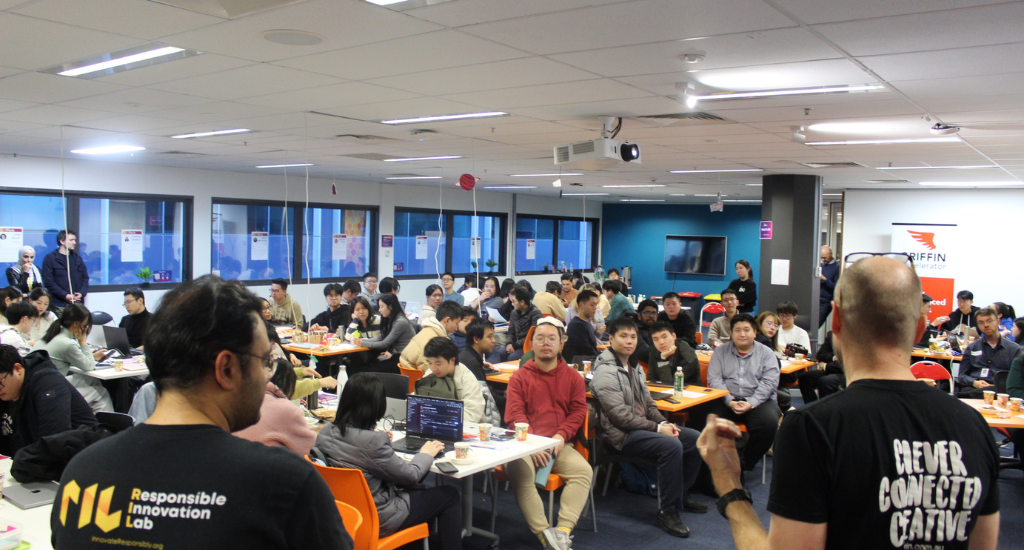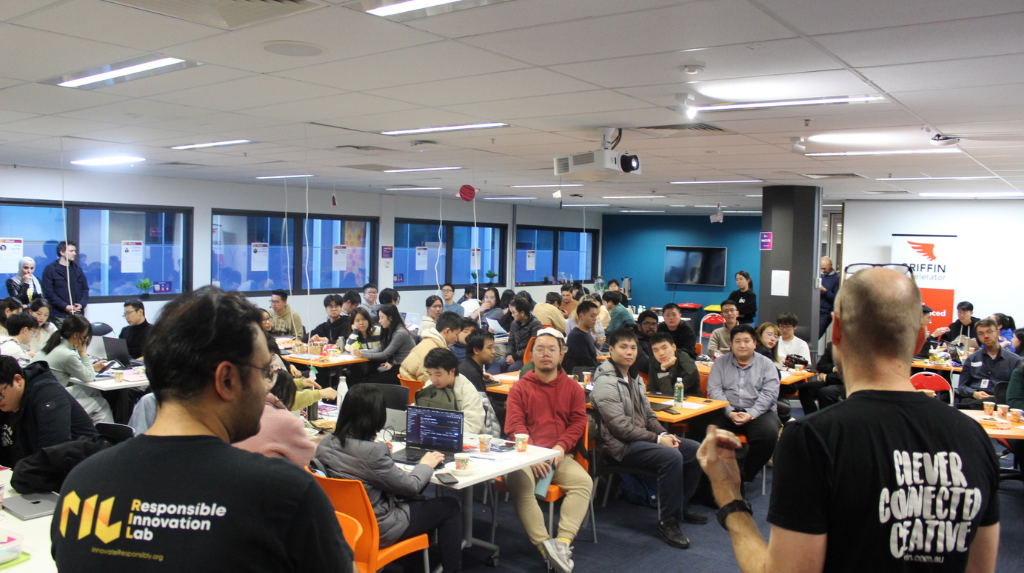- 15 June 2023
- Posted by: Ben Garrett
- Categories: Event News, Feature, General News

On 25 & 26 May, the 3rd Responsible Innovation Hackathon (rHack), was held at the Canberra Innovation Network in collaboration with ANU’s Responsible Innovation Lab. The event brought together 16 mentors, 7 judges and also, over 180 graduate students from the ANU’s engineering and computer science programs.
The Responsible Innovation Hackathon offers a platform for the students to create meaningful solutions, develop business skills, engage with industry professionals and foster a responsible and an ethical approach to innovation. The strong emphasis on responsible innovation, meant that participants were required to think about, present and be judged on their solutions’ social, ethical, and environmental implications to society.
The students were divided into two streams: (1) ChatGPT and (2) Citizen Science: Working with CSIRO and the Atlas of Living Australia.
The ChatGPT stream focused on designing a culturally sensitive artificial aid (‘chatbot’) for facilitating inclusive, democratic deliberation. While the Citizen Science stream was tasked with finding ways to fill data gaps within the Atlas of Living Australia (ALA) by enabling citizen scientists.
The first half of the day was filled with a pitching workshop, which then lead to teams pitching their projects to a panel of industry professionals and academics. During this time they received mentorship, guidance and advice, which they then adapted into their final projects.
After the students polished their presentations, the competition and judging commenced. The teams pitched their final projects to a panel of judges, consisting of experts from various fields. The judging panel then selected the winning teams based not only on their technical excellence, but again focused on how well the teams addressed the social, ethical, and environmental concerns.
Read more about the winners and runners-up from both streams and their innovative, responsible solutions to the challenge statement.
Winners: Citizen Science Stream
Team Name: Dubai Dream
Xuesi Peng, Dibin Joseph, Guangrui Luo, Aishwarya Nambissan
Citizen science involves public participation in scientific research, but data disparities often arise due to individuals’ preferences and accessibility biases. To tackle this issue in Atlas of Living Australia, the team introduces a new data collection platform that combines gaming with data gathering. Users can raise virtual species, compete with friends, and collect data on underreported species. Higher rewards incentivize exploration of rural areas to document rare species. The platform addresses data disparities while considering social, ethical, and environmental aspects. It ensures data ownership, privacy, and informed consent, promoting sustainability and biodiversity awareness. By closing the data gap responsibly, citizen science becomes enjoyable and impactful.
Winners: ChatGPT Stream
Team Name: Appended
Zhongrui Chen, Jiayi Lin, Yuchen Xing, Weihang Zeng
The time-honored practice of scholars reviewing each other’s work, known as peer review, has played a vital role in ensuring the entry of rigorously vetted, credible, and original research into the academic discourse. However, despite its necessity, the peer review process often evokes negative sentiments among scientists. Complaints about varying review quality, reviewers being assigned papers outside their expertise, and overwhelmed editors handling a large volume of submissions are common. To tackle these challenges, many academic publishers are turning to automated tools in their peer review procedures. The team introduces a responsible framework for integrating generative large language models into the peer review process, addressing some of these challenges in academic publishing.
Runners-up: ChatGPT Stream
Team Name: RAMUB
Junzhe Huang, Runsong Jia, Zihan Ai, Xinyu Xie
Large Language Models (LLMs) like ChatGPT have brought about transformative changes in our lives and businesses. However, the excitement surrounding these advancements often overlooks the significant environmental implications they entail. Given the energy-intensive nature of training and operating LLMs, they will result in substantial electricity usage and carbon dioxide emissions. To promote transparency and user awareness, the team introduces a real-time visualization plug-in integrated into GPT-4, quantifying the hidden environmental costs associated with each query (water, energy, carbon emission). This tool aims to foster conscious and sustainable use of AI technologies.
_________________________________________________________
Testimonials
“It is a good place to open your mind and receive valuable feedbacks from your peers and the experiences experts.” – Nanhao Jin (Student)
“Give it a go! This will support your presentation and pitch skills in a very supportive and fun environment.” – Jennifer Bennett (Mentor)
“Being a mentor for the next generation is incredibly rewarding – from the selfless act of helping others, sharing expertise and knowledge, helping them and YOU to expand perspectives. CBRIN provides a smooth event experience where the value of connecting becomes real, and tangible. Go on, pay it forward!” – Dean Conway (Mentor)
“It is a great opportunity for students to explore a different aspect of their projects as compared to conventional submissions” – Alishba John (Judge)
_________________________________________________________
If your organisation is interested in creating solutions to real-world problems, reach out to our Collaborative Innovation team today!

